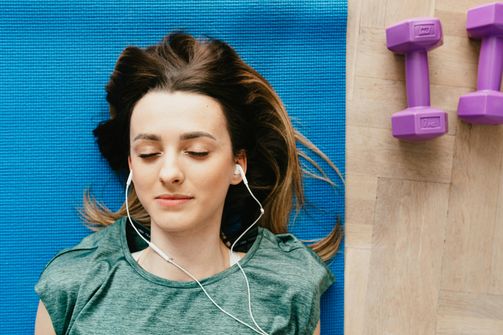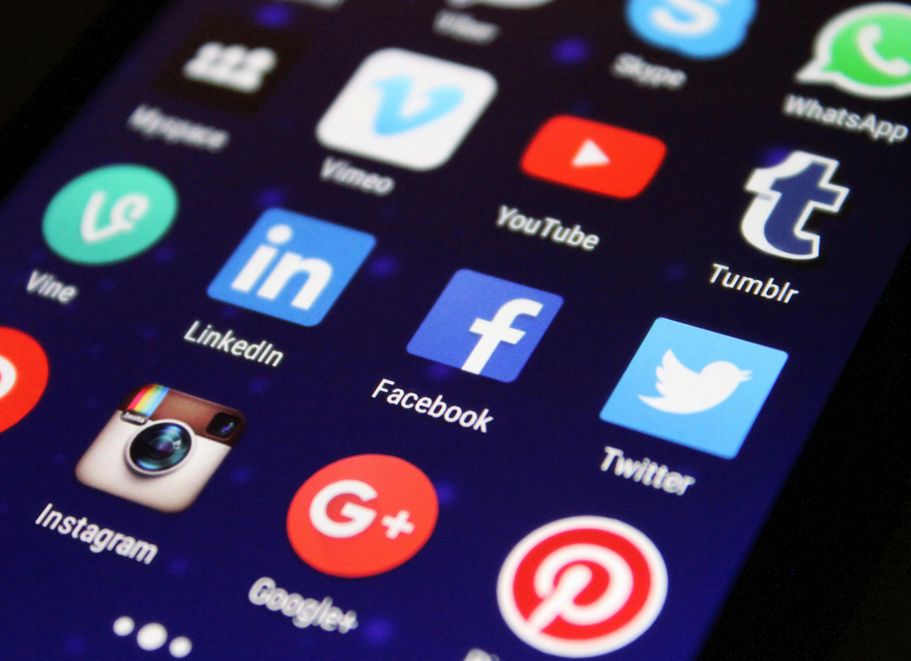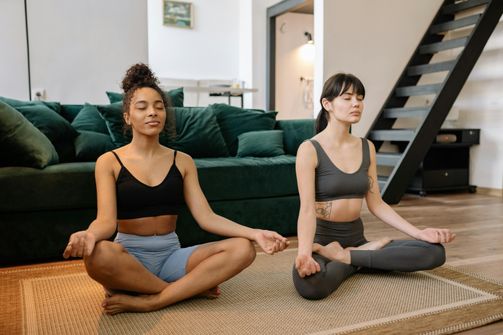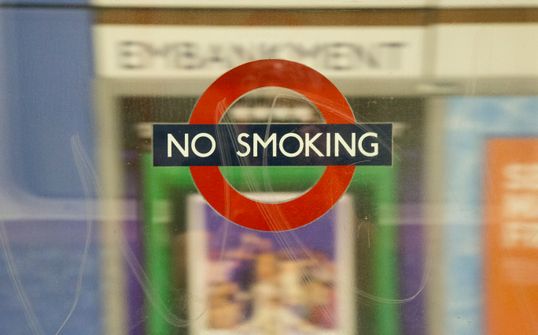
How Sound Therapy Can Help Women Lose Weight
When it comes to weight loss, there’s no shortage of methods, from trendy diets to intense workouts. But here’s a new player on the wellness stage: so...

Social media is everywhere, and let’s be honest—sometimes it feels like it’s controlling our lives. Whether you’re scrolling through Instagram, TikTok, or YouTube, it’s hard not to get swept up in the endless streams of fitness trends, influencer workouts, and picture-perfect body goals. But here’s the thing: while social media can inspire you, it can also create seriously unrealistic expectations about weight loss.
For women especially, it’s easy to feel like you’re falling short. The reality? What you see online isn’t always the full picture. Instead of getting caught up in comparison, it’s time to take back control, focus on what’s real, and make your weight loss journey your own.
Let’s dig into how social media influences your perceptions of weight loss—and how you can avoid the traps while staying true to your goals!

Raise your hand if you’ve ever seen a fitness influencer’s “before and after” pics and thought, “Wow, if I just do that I’ll get the same results!” 🙋♀️ But here’s the problem: most of what you see online is curated, filtered, and edited. That six-pack shot? Might’ve taken a dozen takes and some good lighting. We’re not saying they didn’t put in work, but remember—social media is a highlight reel, not real life.
On social media, you’ll see influencers showing off their best angles, their “clean eating,” and their flawless workouts. What you don’t see? The struggles, the days they missed the gym, or the fact that those “perfect” bodies may not even be sustainable. This constant comparison can lead you to set unattainable goals, leaving you feeling disappointed.
Stat to Know: Women who spend more time on social media are more likely to compare themselves to others and feel dissatisfied with their bodies, according to a study in the International Journal of Environmental Research and Public Health. No one needs that!
Tip: If certain accounts make you feel “less than,” hit that unfollow button! Fill your feed with body-positive influencers like @meganjaynecrabbe who remind you that beauty—and health—comes in all shapes and sizes.
Ever been tempted by “detox teas” or “miracle skinny pills”? We’ve all been there! Social media influencers often promote these quick fixes, but here’s the truth: they’re not only ineffective, but they can also be harmful. Many of these products are unregulated and come with empty promises of fast results that often backfire.
Fact to Know: Over 70% of women who try fad diets regain the weight, according to the Obesity. Yikes!
Tip: Don’t fall for the “get thin quick” schemes. Focus on long-term lifestyle changes instead. If you’re curious about a new trend, talk to a health professional or dietitian before jumping in. Your health is way too valuable to gamble with shady supplements.
We’ve all seen the #30DayChallenge or those “transform in 6 weeks” posts. While they can be super motivating at first, they often promote fitness routines that don’t match your lifestyle or body. The result? You end up feeling frustrated or like a failure when you can’t keep up. Real talk: progress takes time, not just 30 days.
Fact to Know: A study in the Acta Facultatis Educationis Physicae Universitatis Comenianae found that fitness challenges set on social media often lead to frustration and stress, especially when participants fail to meet unrealistic goals.
Tip: Set goals that work for you. Maybe it’s improving your stamina, building strength, or simply feeling better in your skin. Use apps like FitOn or Aaptiv to build fitness plans that are realistic and fit into your life, not someone else’s.

So, how do you stay inspired by social media without getting sucked into the traps? Here are some tips to keep you grounded while still staying motivated.
Instead of following influencers who focus on aesthetics, follow registered dietitians, certified trainers, and experts who share real, balanced advice. These professionals give you realistic tips and focus on health over appearance.
Example Accounts: Follow @drjoshaxe for tips on holistic health and nutrition, or @kayla_itsiness for fitness guidance that’s accessible to all. These accounts offer great insights without the pressure to achieve perfection.
Feeling overwhelmed by social media? It’s okay to take a step back. Constantly comparing yourself to others can mess with your self-esteem and motivation. A social media break can help you refocus on your goals without the noise.
Tip: Try scheduling “phone-free” times throughout your day, especially in the morning or before bed. You can also use apps like Freedom to block social media temporarily and keep you present in the moment.
You don’t need to be perfect to make progress. Social media loves to show flawless transformations, but remember that small victories count too. Whether it’s eating better for a week or squeezing in a workout when you can, you’re moving in the right direction.
Tip: Keep a journal or use an app like MyFitnessPal to track your real progress. Celebrate the little wins, like feeling stronger or improving your energy levels, instead of just what the scale says.
It’s easy to forget that many of the images you see are edited or filtered. Don’t let yourself fall into the trap of comparing your reality to someone else’s illusion. Remind yourself that those “perfect” bodies aren’t always real—and that your body, just as it is, is enough.
Fact to Know: A study in International Journal of Environmental Research and Public Health found that exposure to edited social media images led to higher levels of anxiety and body dissatisfaction among women. Not worth it!
A: Social media platforms often present a highlight reel of fitness journeys, featuring edited images, extreme workout challenges, and quick-fix diet fads. These can create unrealistic expectations, leading women to compare themselves to influencers and feel inadequate or pressured to achieve unsustainable results.
A: Many diet trends promoted by influencers lack scientific backing and can lead to unhealthy habits, such as extreme calorie restriction or using unregulated weight loss products. Following such fads often results in short-term weight loss followed by weight regain, along with potential harm to your metabolism or mental health.
A: It’s important to take breaks and limit your exposure to unrealistic content. Unfollow accounts that promote unhealthy body standards or make you feel insecure. Instead, follow certified trainers, dietitians, or body-positive influencers who emphasize holistic health and well-being over appearance.
A: Social media can be a useful tool for inspiration, but make sure you’re following accounts that offer evidence-based advice from experts, promote balanced approaches to nutrition and fitness, and foster self-love and body positivity.
A: Most social media fitness challenges are not designed with individual needs in mind. What works for one influencer may not suit everyone, and setting personal, realistic goals based on your unique body and lifestyle is key to sustainable success.
A: Look for influencers with professional credentials, like certified personal trainers or registered dietitians. Check if they promote evidence-based information and avoid pushing quick fixes or products that seem too good to be true.
A: Remind yourself that social media is often a curated version of reality. Focus on your own progress, set personal goals, and celebrate your achievements—no matter how small. Taking social media breaks and limiting screen time can also help maintain a healthy mindset.
The content of this article is for informational purposes only and should not be taken as professional medical or fitness advice. Always consult with a qualified healthcare provider, dietitian, or fitness expert before making changes to your health, diet, or exercise routine. The information presented here reflects general guidelines and may not be suitable for everyone, especially if you have underlying health conditions or specific fitness goals.
Social media can either be a motivating tool or a toxic influence on your weight loss journey. The key is to stay grounded in your reality, not someone else’s highlight reel. By following real experts, setting realistic goals, and practicing self-compassion, you can filter out the noise and stay focused on what matters—your health and happiness.
Remember, lasting weight loss isn’t about fitting into a mold created by social media; it’s about making sustainable changes that fit your body and lifestyle. You’ve got this!

When it comes to weight loss, there’s no shortage of methods, from trendy diets to intense workouts. But here’s a new player on the wellness stage: so...

Breathing is something we all do without thinking, but did you know that how you breathe can impact your weight loss journey? That's right! Breathwork...

Quitting smoking isn’t easy. For many women, it’s one of the toughest battles they’ll face. But the good news is, 2024 has brought new tools and strat...

Ladies, let’s talk about something super important: smoking. We all know it’s bad, right? But did you know that smoking can have some extra nasty effe...

Losing weight is challenging for many people, but for women grappling with depression, it can feel especially overwhelming. depression impacts various...